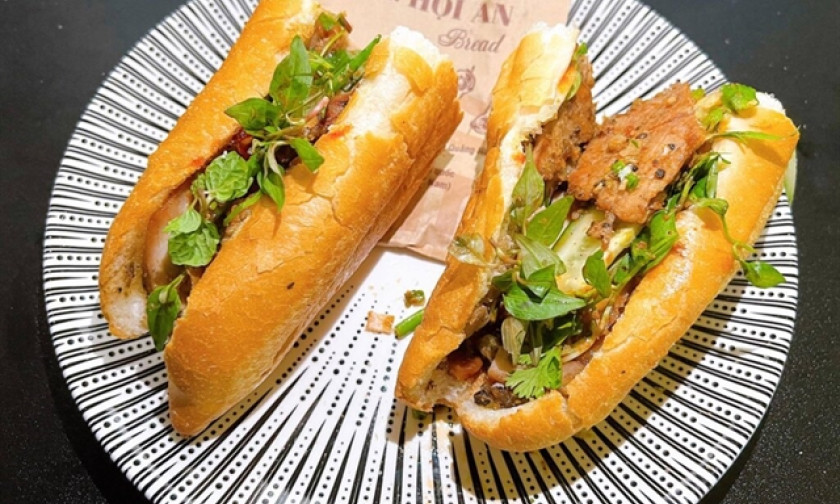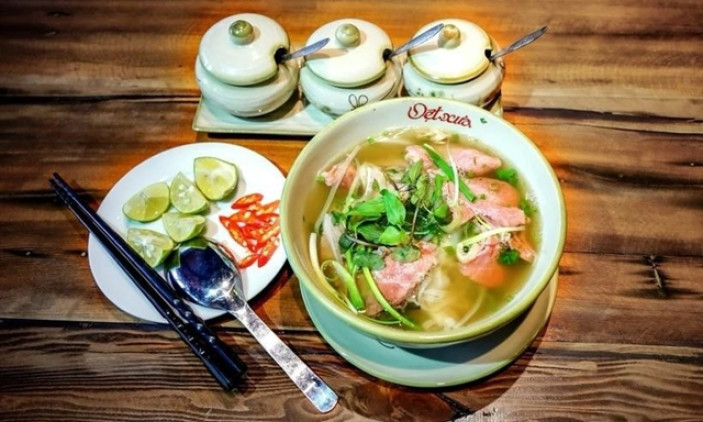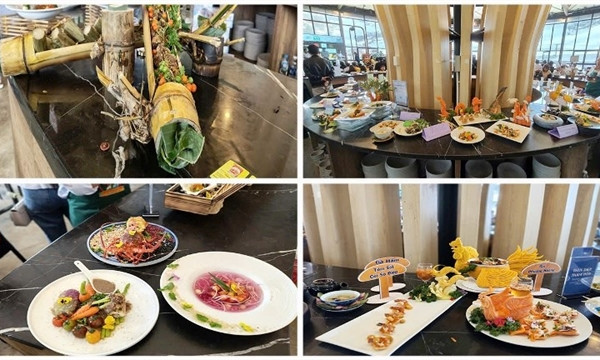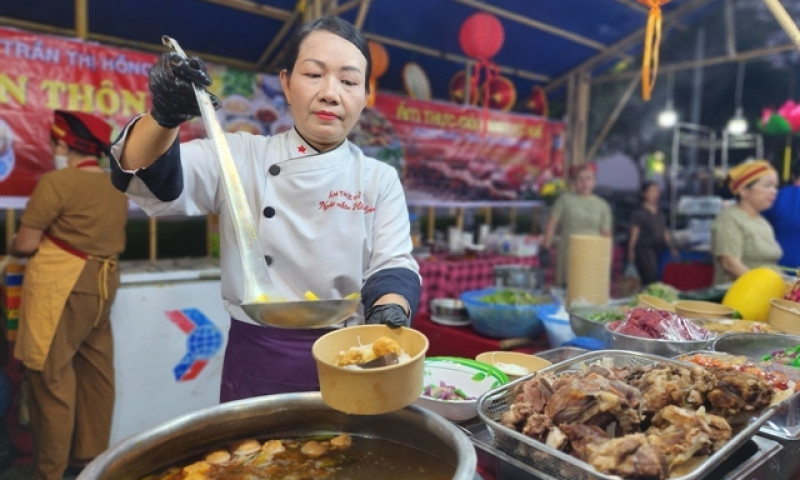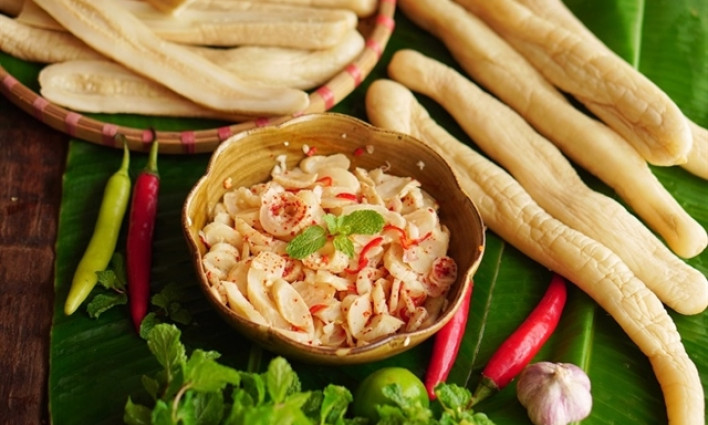A 40-year legacy of crab spring rolls in Hai Phong
For nearly four decades, Thuan Yen restaurant at Co Dao Market in Hai Phong has delighted diners with its crab spring rolls, featuring a crispy crust and a delectable filling of crab meat.
The main ingredient of crab spring rolls is the locally caught crabs from Hai Phong. Unlike traditional spring rolls, which are cylindrical in shape, the crab spring rolls are wrapped in a square form.Diners can savor this delicacy at Thuan Yen’s crab spring rolls eatery, founded by Mrs. Yen nearly 40 years ago. The business is now taken over by her daughter, Nguyen Thi Hai My, 34, who has been running it for the past 15 years.

Located at 88 Tran Nhat Duat Street, amidst a row of houses constructed in 1983, Thuan Yen holds its place in the space of Co Dao Market, previously known as Hai Phong Railway Station.According to Le Chi Nguyen, deputy manager of the Hai Phong Railway Station Market Management Board, this market spans over 8,000 square meters and consists of three-story houses built in 1996, along with ten blocks of four-level houses built in 1983.In the morning, the market bustles with vendors selling vegetables, meat and fish. As the early afternoon approaches, the market transforms into a culinary paradise, attracting visitors with its diverse array of cuisine. Among these delicacies, the crab spring rolls stands out as the most esteemed dish, commanding a higher price than the other offerings.
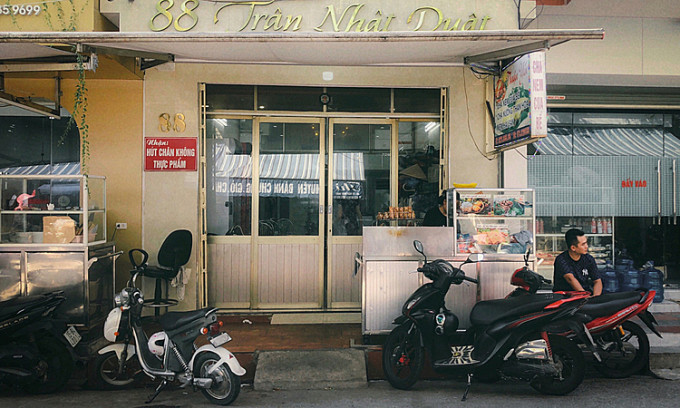
The key to the crab spring rolls at Thuan Yen lies in the fresh, locally sourced ingredients from Hai Phong.My selects crabs from various coastal areas, including Do Son, Cat Ba, and Trang Cat. The restaurant also uses freshly hand-coated rice paper wrappers obtained from Hang Kenh in the Le Chan District.She emphasizes the importance of using fresh rice paper instead of the commercially preserved variety, which tends to be salted for longer shelf life, resulting in a saltier taste. In contrast, the fresh rice paper at Thuan Yen offers a lighter, thicker, and more resilient texture, ensuring a crispiness when the spring rolls are fried.My typically orders 5,000 pieces of rice paper at a time, and they are often sold out within a week. To further enhance the flavors, the sweet and sour dipping sauce used in the dish is made from Cat Hai fish sauce.

My begins her day at 5 a.m. to prepare the ingredients for the spring rolls. The process involves steaming the crabs and removing the meat by hand. Shrimps are peeled, and ground pork is combined with chopped glass noodles, shiitake mushrooms, and wood ear. Each ingredient is kept separately to maintain their distinct flavors.

My wraps the spring rolls into two shapes: oblong cylinders and squares. First, she lays two layers of fresh rice paper on the table and adds the ingredients layer by layer. She starts with bean sprouts and ground meat, followed by crab meat and peeled shrimp on top. She then wraps them in a way that ensures the filling is encased in a cover of rice paper."This method helps prevent excessive moisture from seeping into the rice paper. When the rice paper wrapper becomes too wet, it may affect the freshness and crispness, especially when the spring rolls are transported to distant locations. Moreover, it may cause the wrappers to break and result in an unappealing appearance when fried," My said.
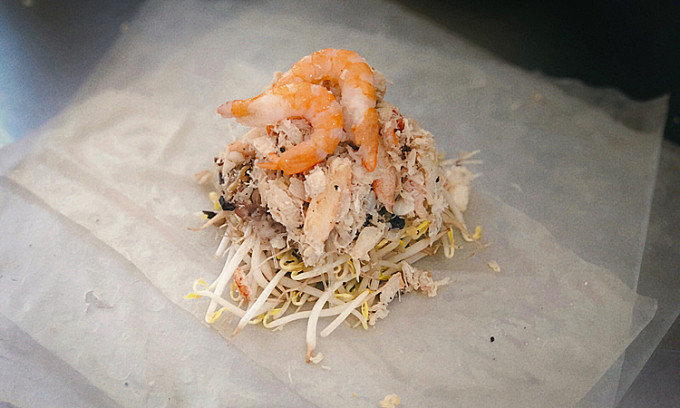
Each crab spring roll weighs around 200 grams, about the size of a hand. As My shared, the people of Hai Phong have a reputation for their hearty appetites, so the spring rolls are generously sized. With each bite, the mouth is filled with the filling. "Even the sight of these sizable spring rolls is enough to whet one's appetite,", My said.

The wrapped spring rolls are fried for about 10 to 15 minutes. The oil is heated to a boiling temperature, and then the heat is lowered to maintain a gentle sizzle. This technique ensures that the fillings of the spring rolls are cooked thoroughly, while the outer wrapper retains its crispness. To meet the high demand during peak hours, the shop is equipped with two fully operational stoves, guaranteeing a sufficient supply of spring rolls.Many diners express a preference for the square-shaped crab spring rolls due to the crunchiness of the crust. My explains that the filling is spread out when being wrapped in a cylindrical shaped spring roll, leading to faster moisture absorption by the rice paper crust.As a result, the crispiness of the crust is diminished. However, the square shape of the spring rolls reduces moisture absorption and allows for the formation of multiple layers of crust, with a less chewy texture. The square is a distinctive characteristic of Hai Phong's crab spring rolls.The crab spring rolls are traditionally served with vermicelli, lettuce, perilla, and apricot leaves, accompanied by a sweet and sour fish sauce infused with cucumber, carrot, and papaya slices. To enjoy the dish, diners can place the vermicelli in a bowl, add the herbs and crab spring rolls, and then drizzle the dipping sauce over the ensemble. This technique ensures that the spring rolls retain their crispiness and prevents any sogginess that may result from water absorption.

The spring rolls are cut into four pieces, exposing a filling packed with ground pork and crab meat. With each bite, diners can indulge in a fusion of flavors, as the meat combines harmoniously with the crab, glass noodles, and the enticing aromas of shiitake mushrooms and pepper. The texture offers a contrast between the crunch of the wood ear and the crispiness of the crust. Each bite produces a satisfying sound as the crust breaks into small pieces.
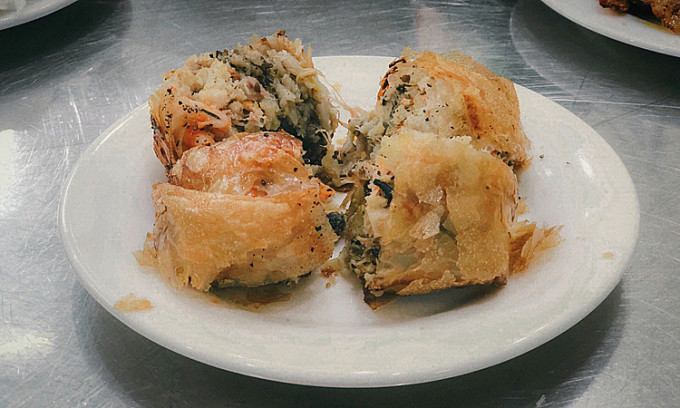
Ngo Duy Lu, 34 years old from Hanoi, shared that among the various types of spring rolls he has tried in both the North and the South, Hai Phong crab spring rolls have left the strongest impression on him."Crab spring rolls offer a diverse taste with two types of proteins. The shredded crab meat is slightly chewy, but it still maintains a firm and sweet flavor without any fishy taste," he said.Lu also mentioned that, despite their deliciousness, he can only manage to enjoy two to three crab spring rolls in one sitting due to their portion sizes. As the deep-fried spring rolls are packed with a generous amount of filling, high protein content, indulging in a large quantity can lead to a sense of discomfort.Apart from enjoying them with vermicelli, crab spring rolls can also be enjoyed as a regular dish on the food tray, often preferred among middle-aged and elderly diners.Thuan Yen’s crab spring rolls are priced at VND70,000 (about $3) per piece, which is relatively high compared to other dishes. My mentioned that she has maintained this price for the past three years despite the increased costs of seafood, meat, and other ingredients.On average, she prepares around 400-500 spring rolls per day, peaking at 1,000 pieces during busy periods. She not only serves customers who visit the restaurant directly but also fulfills bulk orders for customers in neighboring provinces and even southern provinces, ranging from 100 to 200 pieces per order.

Situated in the central market, approximately 800 meters from Hai Phong Station and 500 meters from Hai Phong Opera House, Thuan Yen's crab spring roll restaurant is a favored destination for many diners.The eatery is quite spacious with convenient parking facilities. The air-conditioned restaurant spans around 40 square meters, accommodating up to 50 guests simultaneously. The shop operates from 6 a.m. to 6 p.m. daily and typically experiences peak hours between 11 a.m. and 2 p.m.
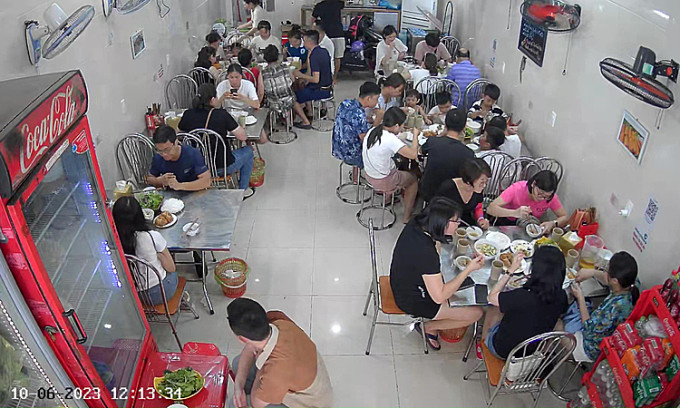
Starting from 4 p.m., My focuses on delivering spring rolls to customer’s homes for dinner or shipping them to train stations and bus stations as gift options. Weekends see a surge in customer numbers as many people visit Hai Phong for a food tour experience.Crab spring rolls are among the specialities that exemplify the diversity of Hai Phong cuisine. In addition to Con Dao Market, diners can find this dish at Cat Bi Market and streets such as Cat Cut, To Hieu and Cau Dat.

